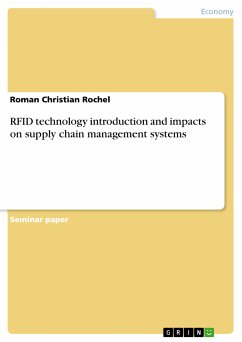Seminar paper from the year 2005 in the subject Business economics - Supply, Production, Logistics, grade: 1,3, European Business School - International University Schloß Reichartshausen Oestrich-Winkel (Suppply Management Institute), course: Seminar of Logistics and Business Engineering, language: English, abstract: Today's businesses face a dynamic and competitive environment which results in an ever increasing pressure on them to innovate, reinvent processes, and leverage the potential of supply chain partnerships. Current supply chain trends, as mentioned by McFarlane and Sheffi, include globalization, outsourcing, stock keeping unit (SKU) proliferation, and shorter product lifecycles.1 To enable these trends and to master the inherent challenges, companies must at all times have information and visibility about shipments, products and progress. Yet, this strongly needed information and visibility is not limited to the internal company supply chain but rather along the entire supply chain from the original supplier to the end customer. Thus, external supply chain integration on the basis of fine granularity of data has to be one of the primary objectives in today's supply chain management efforts. One of the emerging technologies offering a solution for this aim is Radiofrequency Identification (RFID). RFID can facilitate automating and streamlining identification processes. This means more checkpoints along the supply chain can be established at decreased costs. However, not limited to that purpose, the technology offers additional benefits which make it superior to the automatic identification (Auto-ID) technology of the barcode currently in widespread use. Nonetheless, RFID is only a data-collection technology which must be integrated with the supply chain management systems of the companies. Furthermore, along the supply chain various information systems must be integrated in order to give a meaning to the data and to allow for information exchange. Although RFID technology has originally been developed decades ago, the industrial use of RFID in large scale supply chain operations has until now been prohibited due to the relatively high costs compared to other Auto-ID solutions. Recent mandates of large retail companies, such as WalMart and Metro Group, force suppliers in the position where they have to implement the technology without proper knowledge about it. Additionally, there are still several technical as well as rather political barriers to be solved. This seminar paper deals with RFID technology introduction and impacts on supply chain management systems in order to give an insight into the current issues and status of the technology.
Dieser Download kann aus rechtlichen Gründen nur mit Rechnungsadresse in A, B, BG, CY, CZ, D, DK, EW, E, FIN, F, GR, HR, H, IRL, I, LT, L, LR, M, NL, PL, P, R, S, SLO, SK ausgeliefert werden.









